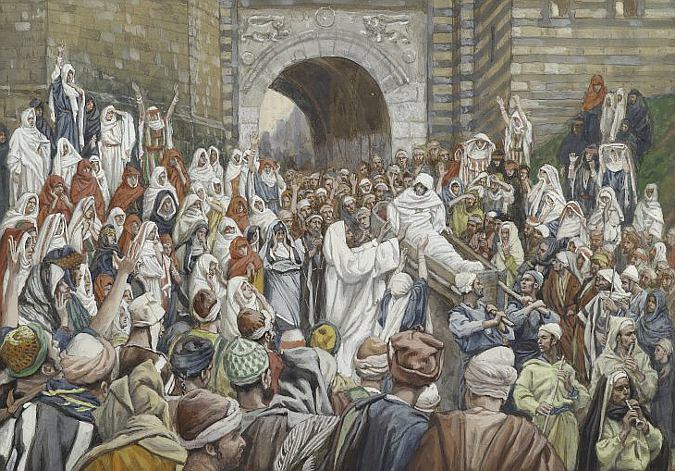
I dag leses evangeliet (i den tradisjonelle kalenderen) om enkens (døde) sønn i Nain (en tekst som nesten helt er blitt borte i vår tid – les om det her):
Lukas 7
11 Kort tid etter gav Jesus seg på vei til en by som heter Nain. Disiplene og en stor folkemengde drog sammen med ham. 12 Som han nå nærmet seg byporten, ble en død båret ut for å begraves. Han var sin mors eneste sønn, og hun var enke. Sammen med henne kom et stort følge fra byen. 13 Da Herren fikk se enken, ble han fylt av medlidenhet med henne og sa: «Gråt ikke!» 14 Så gikk han bort og la hånden på båren. De som bar den, stanset, og han sa: «Unge mann, jeg sier deg: Stå opp!» 15 Da satte den døde seg opp og begynte å tale, og Jesus gav ham til hans mor. 16 Alle ble da grepet av ærefrykt, og de priste Gud. «En stor profet er oppreist blant oss,» sa de, «og Gud har gjestet sitt folk.» 17 Og ryktet om dette kom ut i hele Jødeland og områdene omkring.
Til matutin leses vi hl Ambrosius’ kommentarer til teksten:
Homily by St Ambrose, Bishop of Milan. – Bk. v. Conwi. on Luke vii.
The history which we here read in the Holy Gospel hath for us specially two gracious lessons, the one from the literal, the other from the mystic interpretation thereof. According to the letter then, we see how quickly the compassion of God was aroused by the sorrow of this mother, who was a widow, a widow broken down by nursing her only son, or by the bitterness of her grief for his death. She was a widow also whose worshipful conversation is borne witness to by this, that, much people of the city was with her. Mystically however, this widow encompassed by the multitude was something more than a poor woman whose tears won from the Lord the resurrection of her young and only son; for she is a type of our holy Mother the Church, who calleth back her young children to life from the pursuit of deathly vanities, and soul-slaying honours, by bidding them look on those tears which she sheddeth for such as they, and which it is unlawful for her to shed for them of whom she knoweth that they will rise again.This man, then, being dead, was carried out on a bier to the grave by four bearers, even as the sinner is borne to destruction by the four elements of which he is composed. But there was hope in his latter end, from this, that that whereon he was carried was of wood, and wood, albeit it had profited us little before, is become everything to us now since Jesus touched it, being a figure of that gibbet, the Cross, which was made thereof, and wherefrom salvation floweth unto all people. When, therefore, the horrid bearers of the corpse heard the commandment of God, they stood still, and carried no farther him who was dead through the fatal course of a material nature. And is not our case even as that of the widow’s son, when we lie, as it were, lifeless, in our spiritual coffin, that is, in the last bed of our soul’s death, consumed by the fever of unbridled lust, or frozen by cold-heartedness, or with our whole manliness sapped by some degrading habit of this earthly body, or starved by a spiritual lockjaw that shutteth our mouth to the bright food of our soul? These, and such as these, are they which carry us out to burial.
But even at the last hour, when the hope of life hath been utterly extinguished, and the bodies of the dead are lying by the side of the grave, by the word of God those carcases live again, yea, arise and speak. Then doth Jesus deliver the son to his mother, for Jesus calleth him out of the grave, and delivereth him from death. O, what is the grave of the soul but a bad life? Sinner! thy grave is unbelief, and thy throat is a sepulchre! Even so is it written Their throat is an open sepulchre, Ps. v. ii, whereout breathe their pestilential words. Lo! Christ maketh thee free from that grave! If only thou wilt hear the word of God, thou shalt yet arise from that sepulchre! Yea, though thy sin be exceeding weighty, so that the tears of thine own sorrow cannot wash it away, let thy Mother the Church weep for thee, that longing Mother who weepeth for every one of her children as though he were the only son of his mother, and she was a widow. Believe me, her spiritual anguish is keen like the anguish of nature, when she seeth her children dead in sin, and carried out to be buried for ever.
